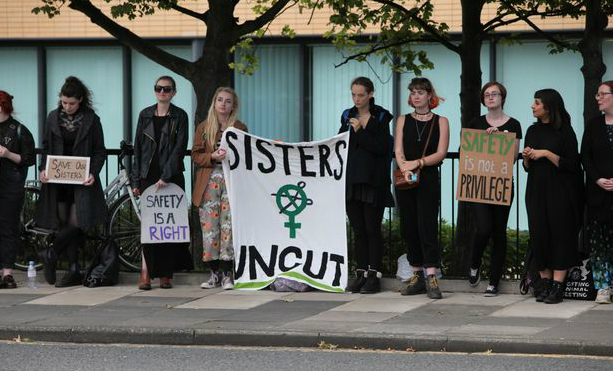
In 2014, Newcastle council began an 18-month procurement process, putting out key domestic violence services out to tender. In May 2016, it announced that the contract had been awarded to Thirteen Care and Support, a not-for-profit charitable subsidiary of Thirteen Group, the biggest group of housing associations in the region. Whilst much has been made of the council’s £1.6m capital investment for new domestic violence accommodation in partnership with Thirteen Care, the existing refuge provided by Newcastle Women’s Aid faces imminent closure.
Thirteen Care and Support was only founded two years ago, whereas Newcastle Women’s Aid (NWA) has 40 years of expertise and experience in supporting victims of domestic violence, and their refuge employs some of the most specialised staff in the country. NWA is a specialist local service run by women, for women and their children. In 2014 the NWA refuge was awarded a stage one Women’s Aid Federation England national quality standards award, recognising this specialisation. In contrast Thirteen Care is currently advertising jobs which don’t require previous experience in domestic violence services, including a full-time apprentice who will be paid a measly £6,366 a year for a 37-hour week. Specialist domestic violence workers are being replaced with ‘independent living workers’, support for working women not eligible for housing benefit is set to be cut, and no proper transfer plan for women using the current refuge has been made available. Further details on the transition are murky, however one thing is crystal clear, despite the council’s spin and a shiny new building, the new contract will result in a loss of specialisation for domestic violence services.
Whilst Thirteen Care and Support currently run domestic violence services in Durham and Middlesbrough, these are primarily focused on accommodation which is offered for a limited 12-week period. The parent company Thirteen Group is a typical example of the mega housing association monopolies of the future. Created in April 2014, following a merger of two north east housing groups, Thirteen now owns and manages more than 32,000 homes from North Tyneside to York. It is one of the top 25 largest housing associations in the country, posting a surplus of £22.4m for 2014-2015. Thirteen Care and Support may not be ‘for profit’ but the Thirteen Group behind it certainly is.
Women’s services have been hit hard by austerity. Women’s Aid’s annual survey for 2015 found that 17% of dedicated providers of specialist refuges stopped running between 2010 and 2014. 44% of responding services were running an area of work without dedicated funding, including 19 refuges which were at risk of imminent closure as a result. Currently, fewer than one in 10 local authorities run specialist domestic violence services and 32 of the domestic violence services that have closed since 2010 were specialist services for black and minority ethnic (BME) women. Women’s Aid further reports that 6,337 women looking for help at a refuge were turned away in 2015. In Newcastle 30,000 incidents of domestic violence were reported to Northumbria police in 2013 – three an hour. 40% of the women attacked had children. The situation is already intolerable. Theresa May’s September 2016 announcement that refuges will be exempt from reductions in local housing allowance rates is a welcome reprieve; yet the never-ending cuts to local authority funding and relentless squeeze on benefits threaten the capacity of refuges to cater for survivors of domestic violence.
In March this year, Newcastle Labour council voted to cut another £30m from our public services – bringing the total to £222m since 2010. That’s £792 per person living in the city. Just under a third of Newcastle council staff have been made redundant, 100% of non-statutory mental health services have been cut, 100% of funding for a volunteer led community support service for women and children experiencing domestic violence has been withdrawn, 65% of Sure Start services have been axed, Elswick pool is now closed with other leisure centres privatised, libraries across the city have had their opening hours slashed in half and all childcare in statutory homeless accommodation has been cut, potentially leaving survivors of domestic violence without recourse to housing benefit faced with the choice of giving up their children or remaining with an abusive partner. While Newcastle’s poorest residents struggle to survive against this tide of cuts, September’s council voted to approve a pay increase of up to £24,000 for Council Chief Executive Pat Ritchie, on top of her salary of £151,000. The council also approved pay rises for four top executives.
On 7 September FRFI supporters joined Sisters Uncut activists in an action at Newcastle Labour council’s monthly meeting. We invited members of the public to lay flowers on a wreath symbolising the loss of specialist domestic violence services in the city. Inside the council meeting activists in bloodstained T-shirts chanted ‘you cut, we bleed!’ in response to Deputy Council leader Joyce McCarty’s cavalier claims about the new contract.
In response, McCarty asserted that an ‘integrated service’, as opposed to NWA’s specialism, will reduce the need for women to tell their stories ‘more than once’, but the new contract will do nothing to unravel the council’s own bureaucracy for women dealing with housing benefit claims or the Children and Family Court Advisory and Support Service (Cafcass). McCarty even claimed that BME women had reported they did not want ‘specialist’ services. This is in stark contrast to findings of local and national BME-led organisations; the Angelou Centre survivors’ charter which was drawn up by survivors themselves cites the need for specialist services. Research in 2014 conducted by the organisation Imkaan points out that many women may never access support unless it is from a BME-led service and can often be excluded from services due to unfamiliarity, information gaps in service provision, cultural incompatibility and a lack of appropriate language services. Specialisation in domestic violence is essential. Again, Newcastle’s Labour council shows its capacity for manipulating reality to fit its purposes.
Sam McGill and James Bell




